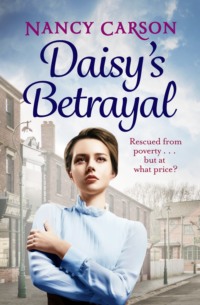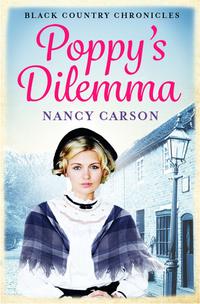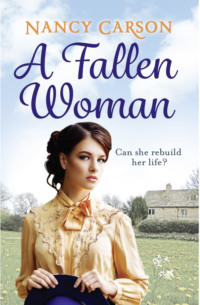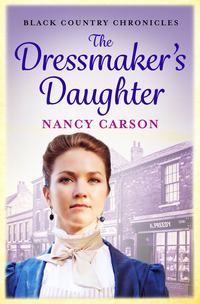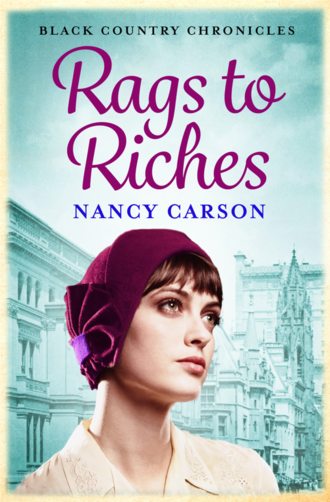
Полная версия
Rags to Riches

Rags to Riches
NANCY CARSON

A division of HarperCollinsPublishers
www.harpercollins.co.uk
AVON
HarperCollinsPublishers Ltd
1 London Bridge Street
London SE1 9GF
www.harpercollins.co.uk
First published in Great Britain by HarperCollinsPublishers 2015
Previously published as Love Songs by Hodder and Stoughton 2000
Copyright © Nancy Carson 2015
Cover images - woman © Superfly Images 2010
Cover images - background © Everett Historical
Cover design © Debbie Clement 2015
Nancy Carson asserts the moral right to be identified as the author of this work.
A catalogue record of this book is available from the British Library.
This novel is entirely a work of fiction. The names, characters and incidents portrayed in it are the work of the author’s imagination. Any resemblance to actual persons, living or dead, events or localities is entirely coincidental.
All rights reserved under International and Pan-American Copyright Conventions. By payment of the required fees, you have been granted the non-exclusive, non-transferable right to access and read the text of this e-book on screen. No part of this text may be reproduced, transmitted, down-loaded, decompiled, reverse engineered, or stored in or introduced into any information storage and retrieval system, in any form or by any means, whether electronic or mechanical, now known or hereinafter invented, without the express written permission of HarperCollins.
Ebook Edition © May 2015 ISBN: 9780008134839
Version: 2018-01-09
Contents
Cover
Title Page
Copyright
Chapter 1
Chapter 2
Chapter 3
Chapter 4
Chapter 5
Chapter 6
Chapter 7
Chapter 8
Chapter 9
Chapter 10
Chapter 11
Chapter 12
Chapter 13
Chapter 14
Chapter 15
Chapter 16
Chapter 17
Chapter 18
Chapter 19
Chapter 20
Chapter 21
Chapter 22
Chapter 23
Chapter 24
Chapter 25
Chapter 26
Chapter 27
Chapter 28
Chapter 29
Chapter 30
Chapter 31
Chapter 32
Chapter 33
Maxine’s Songs
About the Publisher
Chapter 1
‘Living in the same house as Stephen Hemming for two years hasn’t exactly been the most inspiring thing that’s ever happened to me,’ Maxine Kite admitted philosophically to Lizzie, her mother. Maxine had never spoken to her before about her love life but right now, companionable together on this special day in this unfamiliar scullery with its clean whitewashed walls, she felt a compelling need to talk.
‘So what’s wrong with Stephen?’ Lizzie asked, wringing water from a sheet she was rinsing in the deep, stone sink.
‘Oh, I’m not so sure that Stephen’s the problem, Mother. It’s me.’ Maxine stared reflectively at the brass tap that was fixed to the wall, dripping water. ‘I can’t stand his eyes following me at every turn. He makes me feel uncomfortable – as if he’s mentally undressing me.’
‘You poor soul, our Maxine. I sympathise. I can only imagine what it must be like. And yet he seems such a nice, gentle chap.’
‘Oh, he is, Mother. He wouldn’t hurt a fly. He thinks the world of me, I know he does…And I like him – as a friend – he’s a good friend. But I’m not in love with him. I know he’d like me to be, but I can’t help the way I feel about him. And I don’t like him looking at me the way he does, either.’
‘But that’s just men,’ Lizzie remarked. ‘You’re a nice-looking girl, our Maxine. You’ve got lovely dark hair, a lovely trim figure. Men like pretty girls, and they’ll always turn to have a good look at those they think are worth looking at. You must expect it. Be thankful for it, our Maxine.’
‘But it’s when he sits down opposite me…I’m sure it’s only so he can look up my skirt…’
‘Men will always try to look up your frock whether or no.’
‘Yes and I daresay some girls like it when they do, if it’s somebody they fancy who’s having a peep – but I bet they wouldn’t be so keen on Stephen doing it. Whenever I go to my room to change, he always seems to be hovering – as if he’s trying to peer at me through the crack in the door. Even when I practise my cello I have to wear a long, flared skirt to hide my legs. It’s laughable really.’
‘It’s because he fancies you, our Maxine. It’s been worrying me, you and him living under the same roof,’ Lizzie declared frankly. ‘So I take it there’s been no hanky-panky.’
‘With Stephen?’ Maxine scoffed. ‘Mother, you cannot be serious. I just don’t fancy him that way. I’m not especially fond of him touching me. And that’s the trouble. In any case, his mother and father are always around. I’m lodging with them, remember. Not him. The fact that he lives there as well is by the by.’
Maxine perceived the relief in her mother’s expression at her blatantly honest response; she knew Lizzie had always worried about her precious daughters; no doubt she always would. After all, a pretty daughter and a hot-blooded man did not always create a favourable combination.
‘You don’t think you’re imagining all this?’ Lizzie queried sceptically, treating the sheets to another immersion in water so cold that it was making her bare hands tingle.
‘No,’ Maxine replied. ‘I’m not imagining it. Pansy’s noticed as well.’
‘You mean he looks up his sister’s frock?’
‘No, Mother.’ Maxine started to giggle at the unthinkable absurdity. ‘Pansy’s noticed he’s like that with me. He doesn’t give her a second glance. She’s his sister, for goodness sake…So…let’s hope I pass this audition with the City of Birmingham Orchestra. It’ll give me the perfect excuse to get away from him.’
‘Have you told him yet as you’re likely to be leaving?’ Lizzie added some hot water from the gas geyser and looked up from the white cotton sheets as she kneaded out the last trace of suds.
‘Well, not yet. I want to be straight with him, Mom, but I haven’t plucked up the courage yet.’
‘Then it’s time you did, our Maxine.’
‘I know…’ Maxine replied guiltily. ‘I’ll tell him tonight.’
‘And what do you think he’ll say?’
Maxine shrugged. ‘It’s not up to him to say anything.’ She felt suddenly irked that Stephen should be considered important enough to even warrant a say in the matter. ‘It’s my decision, not his.’
‘But he’ll have an opinion, Maxine. Allow him that.’ Lizzie said, wringing a sheet now.
‘Course he will. But he doesn’t own me. Okay, I know he wouldn’t want me to give up lodging at his family’s house, but it’ll be a lot more convenient living here if I get that job. Besides, I don’t want to live in the same house as him any longer.’
‘I take it you’re not thinking of getting married then?’
‘Me, married? I’ll never get married, Mom. It’s not something I desire. I’m married to my music. I’d never marry Stephen anyway.’
‘Never say never,’ Lizzie counselled gently. ‘You just might change your mind.’
Maxine shook her head resolutely and folded her arms as she leaned against the cupboard. ‘No. I’ll never change my mind about Stephen.’
Maxine stared forlornly across the shimmering expanse of water known as Rotten Park Reservoir, which kept Birmingham’s canals topped up. A team of ducks, and the more exotically coloured drakes that accompanied them, sailed importantly some distance from the edge. Moorhens shepherded a waddle of tiny black chicks that bobbed in the radiating rings of a fresh-cast fishing line. It was as pleasant a view, through the yellow-flowered curtains that framed the imperfect panes of the scullery window, as you would find from the rear of any terraced house. Soon, it might be her new home.
Of course, she could return to live with her mother in Dudley but, rather, Maxine was inclined to accept her sister’s offer of accommodation here. She had tasted freedom and relished it. Going back to mother’s she would lose that precious independence. In any event, her self-esteem would not allow her to return home.
Maxine was pinning all her hopes on the audition. It would mean regular work, money in her pocket. But most importantly, it would allow her this much-needed breathing space from Stephen. No, she was not in love with him. Trouble was, he was too fond of her, too protective. He was suffocating her. And this house here in Ladywood, the home of her sister and brother-in-law, was far more convenient for the Town Hall and the CBO’s rehearsal rooms than having to lug her cello to and from his folks’ house in Smethwick, especially on those occasions when she had to make the journey by tram. The trouble was, there had been talk of moving from Ladywood back to Dudley; and that meant Smethwick would be more convenient again. Still, she wouldn’t mention that to Stephen yet; he would only try to get her to stay.
‘I should’ve thought the chances of anybody making a living playing a cello in Birmingham would be a bit limited to say the least,’ Lizzie commented and Maxine detected the same sad scepticism she’d heard a hundred times before. ‘It’s not as if they want a celloist on every street corner.’
‘The word is cellist, Mother,’ Maxine corrected, amused that her mother had got the word wrong. ‘But I can play piano as well, remember…and I can sing. If I don’t get this job in the CBO I’d be quite prepared to play piano and sing – in a pub even.’
‘Over my dead body.’ Lizzie wrung the sheet more animatedly and tossed it into a wicker washing basket with the other, ready to peg out. ‘I’m not having you singing in a public house like some wailing old music hall tart. I’ll see you back home first. You’re not twenty-one yet, remember…Struth, it’s been bad enough worrying over our Henzey up there these last few years, not to mention our Alice. Now I worry about you as well.’
‘You needn’t worry about me, Mom. I’ll be okay.’
‘Famous last words…’
The kettle on the gas stove started to bobble and boil and Maxine applied herself at last to making the pot of tea she should have organised a while ago.
‘I’ll go and hang these sheets out,’ Lizzie said. ‘Don’t forget to pour me a cup of tea before you take some upstairs to our Henzey and Will.’
When she climbed the stairs carrying the tea tray, Maxine thought she heard her name mentioned. The door to Henzey’s and Will’s bedroom was ajar. She pushed it open gently with her foot.
‘Tea!’ Will Parish exclaimed chirpily, and held the door open for her. ‘Thank the Lord. We thought you’d got lost,’
Maxine placed the tray on the dressing table. ‘Sorry I’ve been so long. Actually, I forgot.’ She uttered a little laugh of self-mockery. ‘Telling Mother about Stephen. Then I had a lecture off her.’ She rolled her eyes. ‘So how are you feeling now, Henzey? Tired, I bet.’
‘Tired, but content.’ Henzey ran her fingers through her dark hair and smiled happily. She looked pale but she was entitled to, having just endured childbirth, even though it had not been protracted. Henzey leaned over towards the crib at the side of the bed where the new baby lay. ‘Isn’t he beautiful? Who do you think he’s like, Maxine? D’you think he’s like Will?’
Maxine peered into the crib where the new baby was sleeping. ‘Mmm,’ she murmured indecisively. ‘He’s got your colouring, our Henzey…’
‘But his features are Will’s, don’t you think?’
‘Oh, he looks like himself, Henzey,’ Will protested, half amused at speculation he considered pointless. ‘How can you say who he’s like yet? He hasn’t been born more than a few hours. With a newborn child, I don’t see how you can possibly tell who he’s like. In a week or two you might be able to say. But more often than not, children tend to look like their grandparents.’
‘In that case,’ Henzey declared, ‘he’s bound to be like my father, his hair’s so dark. He was dark, as well, with blue eyes. And tall. Oh, I wish he were here now to see him.’
‘Yes, he’s a bit like our dad, Henzey, now you mention it,’ Maxine conceded, handing a cup and saucer to Henzey.
‘I wish I’d known your father,’ Will said in all sincerity, accepting his cup of tea from Maxine. ‘Thanks, Chick…A real character by all accounts.’
‘A gentleman,’ Henzey uttered nostalgically. ‘Honest and forthright. He used to love to hear Maxine play the piano…Remember, Maxine?’
‘It seems so long ago…’ At the mention of her father Maxine peered out of the window into the back garden, seeking her mother. ‘Mother’s pegging out your sheets, Henzey. I’d better go and help her. It looks freezing out there for April.’
‘Don’t let her stay too long, Maxine. She’s worked hard all day. I don’t know what we’d have done without her.’
‘We’ll just clear up, Henzey. Then we’ll be off. Can I come and see the baby tomorrow? I’d love to hold him. Oh, I’m dying to hold him, Henzey. He’s so beautiful…’
Henzey smiled contentedly. ‘Course you can. Come as soon as you’re ready.’
Maxine’s audition for the City of Birmingham Orchestra fell on 30th April 1936, a Thursday. The large rehearsal room with its high ceiling, its tall, Gothic windows and its sawdusted, woodblock floor, looked and smelled like a school hall. Musical instruments stood or lay haphazardly, unattended, alongside utilitarian metal music stands and the printed scores of Elgar. Leslie Heward, the conductor, asked Maxine some questions about her musical training and she confirmed that she’d spent the last three and a half years at Bantock’s School of Music studying her instrument.
‘Show me what you can do, Miss Kite,’ he said. His demeanour was kindly, maybe to ease her nerves.
‘May I play The Swan from Carnival of the Animals?’
‘Of course. Let me hear it.’ Leslie Heward smiled generously. The Swan was no surprise.
The long hanging notes of a haunting melody, as poignant as a love song, poured from Maxine’s cello like tears. The rich timbre of the instrument, the emotion in her playing, her instinctive grasp of the composition’s spirit, and the visual grace with which she played, all conspired to work positively for her. She was aware of other musicians, including the principal cello, listening intently from the rear of the rehearsal room.
‘That was excellent, Miss Kite. You seem to have a natural empathy with your instrument. I’m impressed.’
‘Thank you, Mr Heward.’ She smiled demurely.
‘What else do you know?’
Maxine had swotted up Dohnànyi’s Konzertstück for cello and orchestra, but Mr Heward heard her play only a part, evidently satisfied already with her ability. He pulled out a volume of music from a pile beside him and asked her to sight read. It was a section from Elgar’s First Symphony. She performed that with expertise too and Maxine knew she had been successful when Mr Heward turned and smiled to one of the musicians sitting at the rear of the hall, who nodded his approval.
‘Congratulations, Miss Kite,’ he said pleasantly. ‘You’ll be receiving official notice to play in all the orchestra’s concerts this season. We’ll be doing Sibelius’s Seventh Symphony soon. Are you familiar with Sibelius’s work?’
‘Some, yes, Mr. Heward.’
‘Excellent. And we’re doing Beethoven’s Fifth, the ‘New World’, Shostakovich’s First, and Tchaikovsky’s Fourth…and lots of Elgar, of course.’ He smiled steadily. ‘Doesn’t scare you, does it?’
Maxine smiled back; her usual shy smile. ‘No, sir, it doesn’t scare me at all.’
‘Splendid! That’s what I like to hear. Thank you, Miss Kite. Rehearsals will start for you here next Monday at ten. I shall look forward to your contribution to the orchestra.’
‘Thank you, Mr Heward,’ she beamed, her delight evident in her eyes that were the colour of her cello. ‘Thank you so much.’
Mr Heward shook her hand and left Maxine to put her cello away while he sought the company and comments of the principal cellist.
While she smiled to herself, so relieved and so pleased that she had got the job she wanted so much, another man, much younger than the conductor, walked up to her. He was in his late twenties she estimated, tall, confident and oh, so good-looking.
‘I think you surprised our lord and master,’ he said amiably, adjusting his fashionable Paisley tie.
Maxine regarded him with interest. ‘Do you think so? How did I manage that, I wonder?’
‘I think he was expecting to hear somebody of average ability. He wasn’t quite prepared for somebody with such a pretty face to play quite so well.’
Maxine felt herself colour up at the compliment. But she was at a loss for a suitable reply, apart from a sadly inadequate ‘thank you’.
‘I’m Brent Shackleton, trombonist in this aspiring orchestra you’ve just joined.’ He held his hand out. ‘Nice to meet you. I really enjoyed listening to you.’
Maxine shook his hand. It was cool, dry and smooth but his grip was lingering. She smiled readily. ‘I’m Maxine Kite. I’m still in a bit of a daze to tell you the truth. I can’t believe I just got into the CBO.’
‘I shouldn’t worry, Maxine. I daresay you’ll soon get used to the idea. Smoke?’ He proffered a silver cigarette case.
‘I don’t, thank you.’
He took one and lit it. ‘I’ve been with this outfit nearly five years now. It keeps me in these…Just about…’ He tapped the cigarette case nonchalantly and she was not sure that she admired his indifference. ‘Where do you live, Maxine? Are you local?’
‘Ladywood,’ she replied, anticipating her new lodging arrangements. ‘With my sister and her husband.’
‘Ladywood? That’s almost walking distance from here, isn’t it?’ He exhaled a cloud of blue smoke.
‘It’s very convenient.’ Her cello was back in its case. She closed the lid and picked it up. ‘Well, I’d better be on my way. Nice to meet you, Mr Shackleton.’
‘Call me Brent. It is all right if I call you Maxine, isn’t it?’
She smiled and lingered a moment. There was something appealing about him after all; the way he looked at her. His dark eyes were focused only on her, piercing, making her feel decidedly self-conscious. But not the way Stephen did. Definitely not the way Stephen did.
‘I’ll see you at rehearsals next week, I imagine,’ she said affably.
‘Shall you come to the concert on Sunday evening?’
‘The concert? I could…I suppose I should really, shouldn’t I?’
‘You should. Come and say hello afterwards. I’ll introduce you to some of the team.’
Stephen Hemming was a quiet, practical, but very determined soul. He was twenty-six, unmarried, living at home with his parents and Pansy, his younger sister. Pansy had introduced him to Maxine Kite when the two girls were attending Bantock’s School of Music together. Stephen fell in love with Maxine on sight. He could not resist her. She seemed so vulnerable and he wanted to protect her, especially since he was predisposed to girls like that. But her apparent vulnerability was not her only attractive feature; she was inordinately lovely with lips that for many sleepless nights he yearned to kiss and creamy curved breasts he longed to caress. And her ears were so delicate, translucent, like finest Dresden china…He was mesmerised that her forearms lacked any of the soft down that every other girl seemed to have. Yet, she was totally unaware of her silky sensuousness. It never ceased to astound him how he managed to keep his hands off her. But she did not allow him such liberties.
Stephen loved art, in its broadest sense, and thus anything artistic and creative. So he saw in Maxine’s musical ability a gift that he wished to see flourish. And she arrived in his life at the right time three years ago when he was languishing over a girl to whom he’d been engaged. Maxine certainly diverted his mind from that trauma.
Stephen designed jewellery in Birmingham’s Jewellery Quarter and he was good. His talent was being sought by several manufacturers since he understood all the manufacturing processes, the techniques and the skill of the people who made the products; and he took account of all this in his designs. He was seriously considering starting his own design house, specifically aimed at serving the abundance of businesses in the area that produced adornments ranging from cheap buttons to creations on a par with the Crown Jewels. His lack of capital, however, was impeding any such progress.
Yet he had made himself afford a car; a 1935 Austin Ten-Four Lichfield. It was bigger than he needed, but it could accommodate Maxine’s cello across the back seat – and that had been the deciding factor. It had set him back one hundred and fifty-two pounds; money he could have used to set up a business. But since he realised he was not extravagantly handsome, owning a car set him apart from other young men and gave him an advantage; in Maxine’s eyes especially, he hoped. Yet, so far, it had done him no good. So far, all that his gallantry had achieved was delivering her, her cello and the rest of her belongings further away from him, to the home of her sister and brother-in-law.
He drove her into Daisy Road in Ladywood and pulled up outside the end of terrace house that was her new home.
‘You can’t imagine how upset I am that you’re leaving us, Maxine,’ he said, making a final attempt to get her to change her mind. ‘The good times, the laughs we’ve had…’
‘It’s not as if I’ve emigrated to Australia, Stephen,’ she replied pragmatically.
‘But you won’t be there when I get home from work, or when I get up in a morning. I’ll miss you, Maxine. I’ll miss you like hell. Pansy will miss you as well. So will my mother and father.’
‘Pansy understands, Stephen. Knowing what it takes to lug my cello about, she appreciates that living here will be far more convenient. Your mother and father understand, too. It’s not as if I’ve upped and left without discussing it. I wouldn’t. And I shall visit them when I can. They’ve been very kind to me while I’ve been lodging there.’
‘Because they love you – like a daughter,’ Stephen commented, trying desperately to invoke greater feelings of guilt in her. ‘But sometimes I get the impression, Maxine, that it’s me you’re trying to get away from.’
‘Oh, I’m not at all,’ she fibbed, affecting indignation, for she was anxious not to hurt his feelings. ‘How can you think that? But seeing each other less often, we might appreciate each other the more. Anyway, thanks for taking the trouble to bring me here. I really appreciate it.’
‘I’ll help you with your things, shall I?’
‘That’s very nice of you, Stephen.’
‘I’ll expect a kiss for my trouble.’
‘And if you don’t get one?’ she asked, half-serious.


